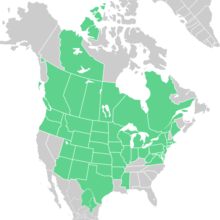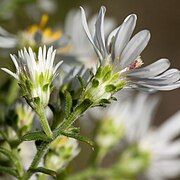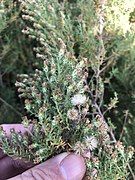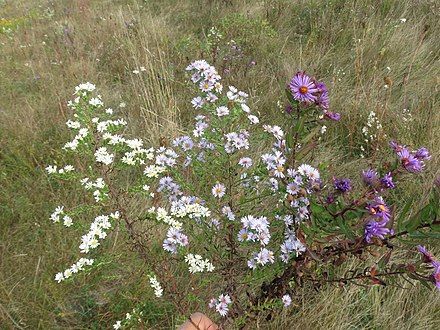Symphyotrichum ericoides
| Symphyotrichum ericoides | |
|---|---|

| |
| S. ericoides in Green Lake County, Wisconsin | |
| Scientific classification | |
| Kingdom: | Plantae |
| Clade: | Tracheophytes |
| Clade: | Angiosperms |
| Clade: | Eudicots |
| Clade: | Asterids |
| Order: | Asterales |
| Family: | Asteraceae |
| Tribe: | Astereae |
| Subtribe: | Symphyotrichinae |
| Genus: | Symphyotrichum |
| Subgenus: | Symphyotrichum subg. Virgulus |
| Species: | S. ericoides
|
| Binomial name | |
| Symphyotrichum ericoides | |
| Varieties[2] | |
| |

| |
| Native distribution[2][3] | |
| Synonyms[2] | |
|
Basionym
Species
var. pansum
| |
Symphyotrichum ericoides (formerly Aster ericoides), with common names white heath aster,[4] frost aster,[5] and heath aster,[6] is a species of flowering plant in the family Asteraceae native to much of central and eastern North America. It has been introduced to parts of Europe and western Asia.[2]
The naturally-occurring hybrid species of Symphyotrichum ericoides and Symphyotrichum novae-angliae (New England aster) is named Symphyotrichum × amethystinum and has the common name amethyst aster. It can grow where the two parents are in close proximity.
Description
[edit]S. ericoides is a perennial herbaceous plant with stems from 30 to 91 centimeters (1 to 3 feet) tall.[6] Its leaves are sessile (stalkless) and narrow, becoming smaller towards the top of the plant and tips of the branching stem. It has white (rarely pinkish), flower heads with yellow centers that begin blooming in late summer and last through fall.[7][8] They are 8 to 10 millimeters (1⁄3 to 1⁄2 inch) across.[6][5]
It is commonly confused with Symphyotrichum pilosum, which co-occurs throughout most of its range.[7][9][2][10] S. pilosum has larger flower heads with longer ray petals. The phyllaries on S. pilosum are spine-tipped, while those of S. ericoides are not, although the curled edges may make them appear to be.[7]
Taxonomy
[edit]Symphyotrichum ericoides has two varieties: S. ericoides var. ericoides, which spreads by underground rhizomes to form colonies, and S. ericoides var. pansum (S.F.Blake) G.L.Nesom, which is cespitose, remaining in a clump, and has corm-like caudices.[3][11]
F1 hybridization with Symphyotrichum novae-angliae can occur where the ranges of these two species overlap. The hybrid is called Symphyotrichum × amethystinum (amethyst aster)[12] and is intermediate between the parent species in most respects.[13]
-
S. × amethystinum, center, is a hybrid between S. novae-angliae, right, and S. ericoides, left.
Distribution and habitat
[edit]Symphyotrichum ericoides grows from Canada across much of the United States into the Mexican states of Coahuila and Nuevo León.[7] The variety S. ericoides var. ericoides prefers open locations with sandy, gravelly, or disturbed soil.[3]
Conservation
[edit]As of October 2022[update], NatureServe listed S. ericoides as Secure (G5) globally, last reviewed on 16 May 2016. On a US state and Canadian province and territory basis, it listed the species as Vulnerable (S3) in New Jersey, Pennsylvania, and Virginia; Imperiled (S2) in Mississippi; Critically Imperiled (S1) in Georgia and Kentucky; Apparently Secure (S4) in Iowa, Manitoba, Maryland, and Northwest Territories; and, Secure (S5) in Alberta, British Columbia, Montana, New York, Ontario, and Saskatchewan. It is reported as an Exotic in Québec. The remaining states, territories, and provinces have not been ranked.[1]
Uses
[edit]Medicinal
[edit]Symphyotrichum ericoides has been used for medicinal purposes among Indigenous peoples of the Americas. It has been documented that the Meskwaki have used the plant both to revive an unconscious person[14] and in a sweatbath as an herbal steam.[15]
Gardening
[edit]Cultivars of Symphyotrichum ericoides are planted in gardens. Plants sold in the horticultural trade labeled as Aster ericoides, the old name of the plant, are usually cultivars or hybrids involving the species S. dumosum, S. lateriflorum, S. pilosum, or S. racemosum, a mistake that has occurred continuously since the 19th century.[7]
The following are cultivars of S. ericoides that have gained the Royal Horticultural Society's Award of Garden Merit:[16]
- 'Blue Star'[17]
- 'Brimstone'[18]
- 'Golden Spray'[19]
- 'Pink Cloud'[20]
- 'Ringdove'[21]
- 'Snow Flurry' (of S. ericoides var. prostratum)[22]
Citations
[edit]- ^ a b NatureServe 2022.
- ^ a b c d e f POWO 2019a.
- ^ a b c Brouillet et al. 2006b.
- ^ USDA 2014.
- ^ a b Hilty 2016.
- ^ a b c Chayka & Dziuk 2016.
- ^ a b c d e Brouillet et al. 2006a.
- ^ Peterson & McKenny 1969.
- ^ iNaturalist 2020.
- ^ POWO 2019b.
- ^ Brouillet et al. 2006c.
- ^ Semple 2014.
- ^ Chmielewski & Semple 2003, p. 1030.
- ^ Smith 1928, 39160.
- ^ Smith 1928, 39159.
- ^ Royal Horticultural Society 2017.
- ^ Royal Horticultural Society n.d.a.
- ^ Royal Horticultural Society n.d.b.
- ^ Royal Horticultural Society n.d.c.
- ^ Royal Horticultural Society n.d.d.
- ^ Royal Horticultural Society n.d.e.
- ^ Royal Horticultural Society n.d.f.
References
[edit]- Brouillet, L.; Semple, J.C.; Allen, G.A.; Chambers, K.L.; Sundberg, S.D. (2006a). "Symphyotrichum ericoides". In Flora of North America Editorial Committee (ed.). Flora of North America North of Mexico (FNA). Vol. 20. New York and Oxford: Oxford University Press. Retrieved 26 July 2021 – via eFloras.org, Missouri Botanical Garden, St. Louis, MO & Harvard University Herbaria, Cambridge, MA.
- Brouillet, L.; Semple, J.C.; Allen, G.A.; Chambers, K.L.; Sundberg, S.D. (2006b). "Symphyotrichum ericoides var. ericoides". In Flora of North America Editorial Committee (ed.). Flora of North America North of Mexico (FNA). Vol. 20. New York and Oxford: Oxford University Press. Retrieved 26 July 2021 – via eFloras.org, Missouri Botanical Garden, St. Louis, MO & Harvard University Herbaria, Cambridge, MA.
- Brouillet, L.; Semple, J.C.; Allen, G.A.; Chambers, K.L.; Sundberg, S.D. (2006c). "Symphyotrichum ericoides var. pansum". In Flora of North America Editorial Committee (ed.). Flora of North America North of Mexico (FNA). Vol. 20. New York and Oxford: Oxford University Press. Retrieved 26 July 2021 – via eFloras.org, Missouri Botanical Garden, St. Louis, MO & Harvard University Herbaria, Cambridge, MA.
- Chayka, K.; Dziuk, P. (2016). "Symphyotrichum ericoides (Heath Aster)". Minnesota Wildflowers. Retrieved 23 September 2016.
- Chmielewski, J.G.; Semple, J.C. (2003). "The biology of Canadian weeds. 125. Symphyotrichum ericoides (L.) Nesom (Aster ericoides L.) and S. novae-angliae (L.) Nesom (A. novae-angliae L.)". Canadian Journal of Plant Science. 83 (4): 1017–1037. doi:10.4141/P01-179.
- Hilty, J. (2020). "Heath Aster (Symphyotrichum ericoides)". Illinois Wildflowers (www.illinoiswildflowers.info). Retrieved 17 October 2020.
- iNaturalist (2020). "Symphyotrichum ericoides: Similar Species". www.iNaturalist.org. Retrieved 17 October 2020.
- NatureServe (2022). "Symphyotrichum ericoides". explorer.natureserve.org. Arlington, Virginia. Retrieved 3 October 2022.
- Peterson, R.T.; McKenny, M. (1969). A Field Guide to Wildflowers: Northeastern and North-central North America. Peterson Field Guides. New York: Houghton Mifflin Company. p. 96: Heath Aster. ISBN 0-395-91172-9 – via Internet Archive.
- POWO (2019a). "Symphyotrichum ericoides (L.) G.L.Nesom". Plants of the World Online. Royal Botanic Gardens, Kew. Retrieved 5 July 2021.
- POWO (2019b). "Symphyotrichum pilosum (Willd.) G.L.Nesom". Plants of the World Online. Royal Botanic Gardens, Kew. Retrieved 17 October 2020.
- Royal Horticultural Society (n.d.a). "RHS Plant Selector – Symphyotrichum ericoides 'Blue Star'". www.rhs.org.uk. London. Retrieved 5 March 2021.
- Royal Horticultural Society (n.d.b). "RHS Plant Selector – Symphyotrichum ericoides 'Brimstone'". www.rhs.org.uk. London. Retrieved 5 March 2021.
- Royal Horticultural Society (n.d.c). "RHS Plant Selector – Symphyotrichum ericoides 'Golden Spray'". www.rhs.org.uk. London. Retrieved 5 March 2021.
- Royal Horticultural Society (n.d.d). "RHS Plant Selector – Symphyotrichum ericoides 'Pink Cloud'". www.rhs.org.uk. London. Retrieved 5 March 2021.
- Royal Horticultural Society (n.d.e). "RHS Plant Selector – Symphyotrichum ericoides 'Ringdove'". www.rhs.org.uk. London. Retrieved 5 March 2021.
- Royal Horticultural Society (n.d.f). "RHS Plant Selector – Symphyotrichum ericoides var. prostratum 'Snow Flurry'". www.rhs.org.uk. London. Retrieved 5 July 2021.
- Royal Horticultural Society (July 2017). "AGM Plants - Ornamental" (PDF). www.rhs.org.uk. London. p. 100. Retrieved 30 November 2018.
- Semple, J.C. (23 February 2014). "Symphyotrichum ×amethystinum Amethyst Aster". www.uwaterloo.ca. Ontario. Archived from the original on 17 January 2021. Retrieved 27 June 2021.
- Smith, H.H. (1928). "Ethnobotany of the Meskwaki Indians". Bulletin of the Public Museum of the City of Milwaukee (Milwaukee, Wisconsin: Pub. by order of the board of trustees of the Public Museum of the City of Milwaukee). 4: 212 – via abstract at Native American Ethnobotany DB (naeb.brit.org).
- NRCS (2014). "Symphyotrichum ericoides". PLANTS Database. United States Department of Agriculture (USDA). Retrieved 17 October 2020.
External links
[edit]- NatureServe secure species
- Symphyotrichum
- Flora of Western Canada
- Flora of the Northwest Territories
- Flora of Ontario
- Flora of the Northwestern United States
- Flora of the North-Central United States
- Flora of the Northeastern United States
- Flora of the South-Central United States
- Flora of Alabama
- Flora of Arizona
- Flora of Arkansas
- Flora of Delaware
- Flora of Georgia (U.S. state)
- Flora of Maryland
- Flora of Mississippi
- Flora of Tennessee
- Flora of Utah
- Flora of Virginia
- Flora of Coahuila
- Flora of Nuevo León
- Plants used in traditional Native American medicine
- Plants described in 1753
- Taxa named by Carl Linnaeus








